Indonesia gets Rp 232 billion grant from EU to ease trade negotiations
Indonesia’s trade sector has received its Christmas gift early: The European Union has granted Indonesia Rp 232 billion (US$16.37 million) through a program dubbed ARISE+ Indonesia to improve trade conditions and capacity between 2019 and 2023.
“The key objective is to strengthen the export and trade competitiveness of the Indonesian economy and the strategic goals of [Indonesia’s] 5-year plan,” EU delegation head for Indonesia, Vincent Piket, told reporters in a press conference in Jakarta on Wednesday.
Among other ways, the EU is to use the funds to provide technical support to promote geographical indications, as quoted by its press release. The bloc is also to help the Investment Coordination Board (BKPM) by conducting a study on how to better target and prioritize sectors for investments.
“In view of the ongoing negotiations for an EU-Indonesia Comprehensive Economic Partnership Agreement (IEU-CEPA), ARISE+ Plus Indonesia will also have the flexibility to respond to issues emerging from the negotiations through rapid response facility which can be mobilized on short notice,” Piket said in a speech prior to the press conference.
He explained that the assistance includes funding expertise to build the capacity of ministries and government agencies, as well as the dissemination of CEPA results to support negotiations.
The grant was given amid trade tensions between the two jurisdictions. Under the draft of the IEU CEPA, palm oil-based biofuels were listed as unsustainable and, as such, the EU would phase them out.
As Indonesia’s largest palm oil customer, the EU denied allegations that it had deliberately tried to undermine the market for the commodity, citing market demand as the reason for its problems.
Still, Indonesia, the world’s top palm oil producer and exporter, is committed to fighting the EU’s ban on the use of palm oil for its member countries’ biodiesel.
Indonesia had even previously threatened to take the issue to the World Trade Organization, as it believed that palm oil production was more environmentally friendly than the production of other vegetable oils like soybean oil, sunflower oil and rapeseed oil.
“There is one chapter, namely trade and sustainable development, in which it was difficult to reach an agreement. The discussions included vegetable oil,” the Trade Ministry’s international trade negotiation head Iman Pambagyo said prior to the seventh round of CEPA negotiations in March.
Source: https://www.thejakartapost.com/news/2019/09/30/indonesia-gets-rp-232-billion-grant-from-eu-to-ease-trade-negotiations.html


 Thailand
Thailand




